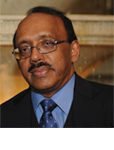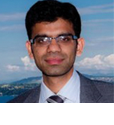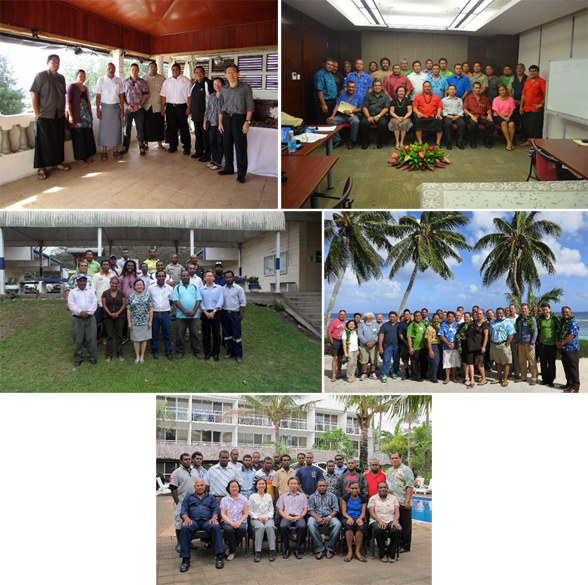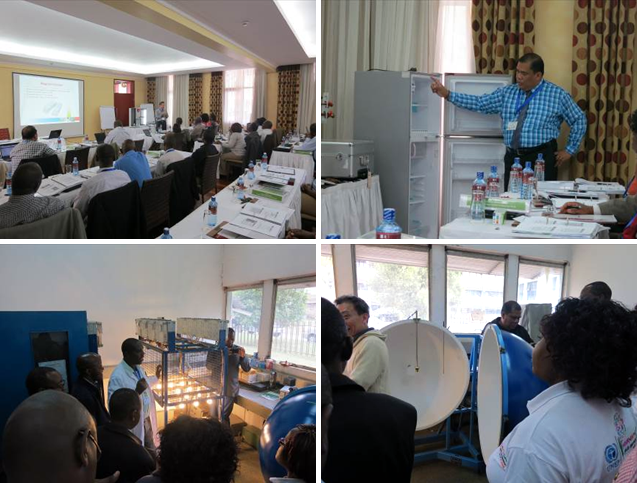| |
 |
| Newsletter of the International Institute for Energy Conservation (IIEC) |
December 2013 |
|
| |
| |
|
IIEC Board Announces CEO and New Direction for IIEC South Asia
|
 Rob Pratt, Chairman of the IIEC Board of Directors, recently announced the appointment of Felix Gooneratne as the Institute’s new Chief Executive Officer (CEO). Felix will assume the overall management responsibility for the IIEC’s operations worldwide, having served the Institute since 2001 as the Asia Director based in Bangkok with responsibility for the management of IIEC offices in India, Philippines and Thailand. In 2006, after the successful completion of the USAID funded ECO II Project in India where Felix was the Team Leader, his efforts focussed on expanding the network of projects of IIEC-Asia. During the recent years, IIEC-Asia has expanded to several countries in Asia, Pacific and Africa including Vietnam, Lao PDR, Cambodia, Sri Lanka, Malawi, Kenya, Mauritius, Lebanon and the Pacific Islands. Rob Pratt, Chairman of the IIEC Board of Directors, recently announced the appointment of Felix Gooneratne as the Institute’s new Chief Executive Officer (CEO). Felix will assume the overall management responsibility for the IIEC’s operations worldwide, having served the Institute since 2001 as the Asia Director based in Bangkok with responsibility for the management of IIEC offices in India, Philippines and Thailand. In 2006, after the successful completion of the USAID funded ECO II Project in India where Felix was the Team Leader, his efforts focussed on expanding the network of projects of IIEC-Asia. During the recent years, IIEC-Asia has expanded to several countries in Asia, Pacific and Africa including Vietnam, Lao PDR, Cambodia, Sri Lanka, Malawi, Kenya, Mauritius, Lebanon and the Pacific Islands. |

|
|
| IIEC - South Asia Operations |
| The IIEC-India operations are currently undergoing major restructuring to meet the challenges and project opportunities in South Asia. The relocation of the office in Pune to Mumbai has been completed and is in the process of establishing a corporate office in New Delhi to manage business in South Asia. |
|
We are pleased to announce the appointment of Sanjay Dube as Director, South Asia. Sanjay was with IIEC during 2001 – 2006 and in his new role will structure the operations in South Asia. Sanjay has over 25 years of experience in planning, management and implementation of energy and climate change programs in India and South East Asia. Sanjay has managed a number of large energy and environment programs funded by different national and international agencies. He has served as Chief of Party for USAID funded "Partnership to Advance Clean Energy – Deployment (PACE-D) Project". Prior to that Sanjay worked as Vice President with Emergent Ventures International and headed their Sustainability and Climate Value Advisory Business Practice. From 2006 to 2010, Sanjay headed the Energy Efficiency & Climate Change Practice at ICF International in New Delhi. |
 |
|
| We are also pleased to announce the recent hiring of following key staff at IIEC's Mumbai office: |
| Ameya Udgaonkar has been engaged as a Senior Energy Specialist and will be located at IIEC office in Mumbai. Ameya holds a Master’s Degree in Mechanical Engineering from the San Diego State University, California and has been in the energy consulting sector in both India and USA. His expertise is in the fields of energy efficiency, renewable energy, energy standards and labelling, energy policy and regulations, demand forecasting and econometric analysis. He was with PricewaterhouseCoopers (PwC) in New Delhi from May 2011 to November 2013 holding the position of Senior Consultant since March 2013.
|

|
|
Amit Tripathi has been engaged as an Energy Specialist and is located in IIEC office in Mumbai. Amit’s areas expertise is in the fields of the HVAC and Environment industry in India. He was the Manager, Strategy & Business Development for Terracon Ecotech Ltd (Mumbai) in the field of environment, ecosystem services / biodiversity and clean technology. He was also a Project Engineer at Daikin Airconditioning Ltd (Hyderabad).
|

|
|
|
|
|
| |
|
IIEC Delivers Energy Audit Training in the Pacific
|
 Under the Promoting Energy Efficiency in the Pacific – Phase 2 (PEEP2) Project, funded by the Asian Development Bank, the International Institute for Energy Conservation (IIEC) is tasked with the development and conduct of energy audit training programs for local experts in each of the Pacific Developing Member Countries (PDMCs) covered under PEEP2 - Cook Islands, Papua New Guinea, Samoa, Tonga and Vanuatu. Under the Promoting Energy Efficiency in the Pacific – Phase 2 (PEEP2) Project, funded by the Asian Development Bank, the International Institute for Energy Conservation (IIEC) is tasked with the development and conduct of energy audit training programs for local experts in each of the Pacific Developing Member Countries (PDMCs) covered under PEEP2 - Cook Islands, Papua New Guinea, Samoa, Tonga and Vanuatu. |
|
|
The overall objective of the training program is to build capacity of local professionals with the necessary energy auditing skill sets enabling them to provide continuous support to the government departments, building owners, industries and households. |
| Therefore, in addition to the walk-through energy audit training conducted in 2012, IIEC will be carrying out a series of detailed energy audit training workshops from July 2013 to April 2014 in the 5 PDMCs. The first workshops will focus on Module 1 (Walk-Through Energy Audit), and Module 2 (Technical and Financial Evaluation). The second workshops will focus on Module 3 (Contracting, Project Management, and Measurement & Verification of Energy Efficiency Projects) and Module 4 (Detailed Energy Audit – Investment Grade Audit). |
| The Module 1 and 2 workshops were already successfully held from July to October 2013 in the five PDMCs, as shown in the photographs below. The workshops were kindly supported by the PEEP2 implementing agencies in each respective country. |

 Attendees of the Energy Audit Training in Tonga (top left), Samoa (top right), Papua New Guinea (middle left), Attendees of the Energy Audit Training in Tonga (top left), Samoa (top right), Papua New Guinea (middle left),
Cook Islands (middle right) and Vanuatu (bottom) |
For more information on the PEEP2 Project, please visit the project website on
http://www.ee-pacific.net or contact
David Morgado - dmorgado@iiec.org |
|
Back to Top 
|
|
|
|
| |
|
IIEC Completes Comprehensive S&L Training in Kenya
 On June 2013, IIEC delivered a detailed three-day and a half technical training workshop on Standards and Labeling (S&L) to key implementers in Kenya. This followed from an introductory S&L training held by IIEC in May 2013 for policymakers.
On June 2013, IIEC delivered a detailed three-day and a half technical training workshop on Standards and Labeling (S&L) to key implementers in Kenya. This followed from an introductory S&L training held by IIEC in May 2013 for policymakers. |
|
This project was part of the on-going national Standards and Labelling Programme, which is a 5 year initiative designed to remove barriers to market transformation of energy efficient products and services in Kenya. The program is funded by the United Nations Development Programme (UNDP) with the support from the Ministry of Industrialization and Enterprise Development. |
|
| The training covered mainly the testing procedures, performance standards and certification for: |
|
Compact Fluorescent Lamps and Fluorescent Tubes, |
|
Domestic and Commercial Refrigerators, |
|
Air Conditioners, |
|
Three-phase Electric Induction Motors. |
|
It also included a visit to the Kenya Bureau of Standards Light Testing Facility to fully understand the current performance and safety testing procedures undertaken for Compact Fluorescent Lamps (CFLs) in Kenya. |
|
Overall, there was a total of 43 attendees including staff from the Ministry of Energy and Petroleum, Ministry of Industrialization and Enterprise Development (MOIED), Energy Regulatory Commission (ERC), Kenya Power, National Environment Management Authority (NEMA), Kenya Bureau of Standards (KEBS), Anti-Counterfeit Agency (ACA), the Kenya Revenue Authority (KRA), Kenya Association of Manufacturers (KAM) and Jomo Kenyatta University of Agriculture and Technology (JKUAT). |

 Attendees of the S&L Training delivered by IIEC in June 2013 (above) and visit to the KEBS Light Testing Facility in Nairobi (bottom) Attendees of the S&L Training delivered by IIEC in June 2013 (above) and visit to the KEBS Light Testing Facility in Nairobi (bottom) |
| For further information, please contact David Morgado - dmorgado@iiec.org |
Back to Top  |
|
|
|
| |
|
| |
|
| |
|
World Bank Institute Refers to IIEC in Global CFL Toolkit
 The IIEC has extensive experience in the implementation of large scale energy efficient lighting programs in developing countries in Africa and Asia-Pacific region. The IIEC has extensive experience in the implementation of large scale energy efficient lighting programs in developing countries in Africa and Asia-Pacific region. |
| In India, IIEC was contracted by the USAID to support the Bangalore Electricity Supply Company (BESCOM) in designing and implementing the BESCOM Efficient Lighting Program (BELP). The objective was to target 1.8 million consumers with the message of “Lighting up your life ….. Efficiently”. As part of the project, approximately 475,000 Compact Fluorescent Lamps (CFLs) were distributed together with awareness materials. The program resulted in savings of 17 MW of peak demand over a period of 9 months in the city of Bangalore, and the program design is now being used as a model by other utilities in India. |
| In Viet Nam, IIEC conducted the evaluation of the Viet Nam energy efficient lighting program for the World Bank and the Electricity of Viet Nam. IIEC was tasked with program monitoring and developing a tracking system for the CFL program, including appropriate performance indicators as well as conduct of detailed evaluations of CFL program and recommend refinements to program design. |
| In Lao People's Democratic Republic, IIEC was the technical consultant for a World Bank funded project on demand-side management (DSM). The IIEC project team prepared a Compact Fluorescent Lighting program design and provided support to the Electricite du Laos (EDL) in the procurement of 400,000 CFLs. The distribution and installation of CFL will commence under Phase 2 of the DSM project which was awarded to IIEC in August 2013 (see news item above). |
| In the Philippines, IIEC is currently providing technical assistance to the Philippine Department of Energy (DOE) in the procurement and distribution of more than 8.6 million CFLs nationwide, under a loan from the Asian Development Bank.The estimated energy savings are of 290 million kWh/year equivalent to almost 3 billion pesos. |
| In Malawi, IIEC recently designed and implemented a 2.0 million CFL program and developed the guidelines for lamp waste management in a project funded by the Department of International Development in the UK (see news article on Malawi in this E-Notes). |
| IIEC’s vast knowledge and wealth of experience was recently referenced in the World Bank Institute’s new CFL experience toolkit. The toolkit provides a guide on how to create a CFL program and references a number of projects and documents prepared by IIEC. The toolkit is available on http://wbi.worldbank.org/energy/energy-efficient-household-lighting-cfl-experience. |
| For more information on the above projects visit www.iiec.org or contact Felix Gooneratne - fgooneratne@iiec.org |
|
Back to Top 
|
|
|
|
| |
| |
About IIEC
The International Institute for Energy Conservation (IIEC) was established in 1984 as a non-governmental (NGO), not-for-profit organization, in order to foster the implementation of energy efficiency in developing countries and countries in transition. IIEC’s mission is to accelerate the global adoption of energy efficiency, transport and environmental policies, technologies and best practices to enable sustainable economic and environmental development. |
| For the past 29 years, IIEC has been providing solutions to the problems posed by the rapid increase of energy demand in developing and industrializing countries. IIEC has an established niche as a provider of novel solutions with the flexibility to work simultaneously with multilateral institutions, governments, academic and research institutes, industry and non-governmental organizations. |
|
 If you do not wish to receive IIEC E-Notes, please reply to e-notes@iiec.org with the word "UNSUBSCRIBE" in the subject line. If you do not wish to receive IIEC E-Notes, please reply to e-notes@iiec.org with the word "UNSUBSCRIBE" in the subject line. |
| |
 |
Partners for Sustainable Energy and Environmental Solutions  |
|
|
 |
| Head Office : |
 |
Asia Regional Office : |
Country Offices : |
|
USA
Tel: +1 703 464 0561
Fax: +1 703 689 4427
e-mail: iiecdc@iiec.org |
Thailand
Tel: +66 2 662 3460-4
Fax: +66 2 261 8615
e-mail: iiecbangkok@iiec.org |
India
Delhi
Tel: +91 124 405 9969
Mumbai
Tel: +91 22 2592 5215-17
e-mail: iiecindia@iiec.org |
Philippines
Tel: +632 426 8567/426 6001 loc 4833
Fax: +632 426 8566
e-mail: iiecmanila@iiec.org |
|
 |
| Copyright © 2013 International Institute for Energy Conservation, All Rights Reserved. |
|
